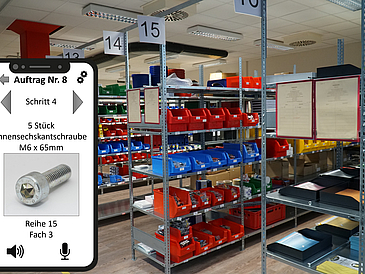Digitalization has caused a significant change to occur in conditions in different fields of work and work processes. New skills and digital competence that are closely connected to the classic cultural technologies are required. This creates new challenges, especially for handicapped people. Some of said group can only read or understand words in a restricted manner, for example, and thus only write texts that relay the gist. It is these obstacles that must be overcome. This is possible thanks to digitalization technologies: They are not only significant for work processes, but also in compensating for low or missing resources. This increases the participative chances of handicapped people in the working world.
With the “BASDA” (Realization of an Accessible Assistance System for the Step-by-Step Completion of Work Tasks - “Realisierung eines barrierefreien Assistenzsystems zur schrittweisen Durchführung von Arbeitsaufgaben”) assistance system, BIBA and Bremer Berufsbildungswerk want to create a tool that can offer accessible, flexible, and individual support for task-based work processes.
The aim is to enable people with learning, physical, or psychological impairments to autonomously carry out work tasks with the support of a mobile device. For this purpose, a cross-platform, Android application that provides multimedial and accessible information on individual work steps is being developed.
Multimedia Approach with the Help of EEF and AR Technology
The system will offer diverse configuration options, in order to fulfill the individual requirements of each user. Thus, in terms of supporting accessibility, settings for simple language, speech reproduction, visualized pictograms, animations, different color palettes for color vision deficiencies, as well as technologies that simplify spatial envisioning are being integrated. The system operates on Android so that it can be used with tablets, smartphones, and data glasses (AR: augmented reality). Additionally, the implementation of noise-canceling headphones and controlling via an EEG sensor (EEG: Electroencephalography) are being tested.
“The research focus lies on the testing of innovative HMI technologies in an accessible application context,” says Benjamin Knoke, project lead at BIBA. “Those are human-machine interfaces, such as data glasses. The smartglasses provide users with helpful information in addition to their real surroundings, thus they offer an augmented reality (AR). Moreover, we are carrying out research in the project on the application of EEG sensors, which is new for this field. They can be worn much similarly to a headband and measure the user’s brain currents. In this way, simple input can be made and the assistance system can be controlled by thought.”
System Will Be Available for Free
Alongside the assistance system, a task portal, with which companies can create content on individual working tasks, will be created. In this low-threshold user system, information and media content are matched to specific working steps. The portal can also be used for the organization of courses and the distribution of participants, participant groups, and contents. A function to assess work performance will be tested in the context of training and will be combined with a game-like incentive system. The assistance system and task portal will be available for free after the project has been completed.
The “BASDA” Project
The Realization of an Accessible Assistance System for the Step-by-Step Completion of Work Tasks - “Realisierung eines barrierefreien Assistenzsystems zur schrittweisen Durchführung von Arbeitsaufgaben” research project (BASDA) will run for twelve months and is being funded by the Amt für Versorgung und Integration Bremen (Social Affairs Office Bremen) (AVIB). The project partners are the Bremer Berufsbildungswerk (BBW) and BIBA- Bremen Institute for Production and Logistics GmbH at the University of Bremen. BIBA functions as the coordinator and head of the project. The research and development of the novel assistance system is to support the integration of people with impairments into working life, starting with vocational training.
Sabine Nollmann
Contact:
Prof. Dr.-Ing. habil. Klaus-Dieter Thoben
Institute Director
BIBA - Bremen Institute for Production and Logistics GmbH
Phone: +49 421 218-50005
Email: thoprotect me ?!biba.uni-bremenprotect me ?!.de
Benjamin Knoke, M. Sc.
BASDA Project Leader at BIBA
BIBA - Bremen Institute for Production and Logistics GmbH
Phone: +49 421 218 50185
Email: knoprotect me ?!biba.uni-bremenprotect me ?!.de
Further Information:
www.basda.de
www.biba.uni-bremen.de/en.html
www.bbw-bremen.de
www.uni-bremen.de/en/

